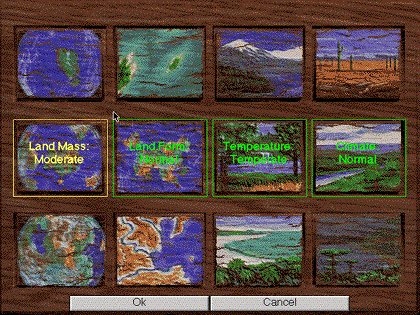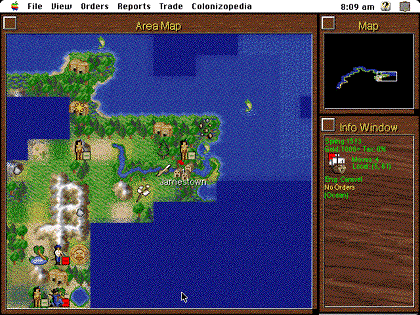Review: Colonization

System Requirements
LCII or better
8 MB RAM
System 7 or later
256 colour monitor
13 MB disk space
CD-ROM drive
Game Overview
Colonization is set between 1500 and 1800 AD—the time when European powers were expanding by exploring the earth for new territories. You start off in a little boat, with few resources. You are both a soldier and a pioneer. A vast, undiscovered land lies in front of you (soon to be America, of course). Your task is to land on this new world, explore, and colonize. Your orders come from the king or queen of your chosen country (either Spain, England, the Netherlands, or France) and you must obey them—at least for now. The interface is similar to Civilization.
Your orders include the building and developing of colonies, trading with your mother country, exploring, talking with the natives (or fighting, the choice is yours), finding "lost cities" or other places where there might be treasure, and keeping the rival colonists under control. A difficult task? You bet. Colonization is a very big game with loads of options. The replay value approaches infinity and it is very complicated. Good online help is available and the interface is intuitive, but I recommend a good read of the manual. Don't let this put you off, though—Colonization is very addictive and fun to play.
Installation
When you open the box of the game, a 127 page manual falls out along with two "player's aid" cards, which provide pictures and brief descriptions of the game. Don't throw these out! I found them very useful. Although the manual is written for the PC version, it doesn't really matter. Only half a page is given up for "PC installation." The Mac-specific instructions come on one of those annoying pieces of paper that developers seem to put in as a last minute extra. Oh well, nobody's perfect.
The whole game is installed on the hard disk, freeing the CD drive while you're playing the game (although it does have some nice audio tracks). I had only one problem installing the game—you need to have foreign file access on for the installation to succeed.
Give Me Details
Once the game is up and running, you are presented with a screen asking you whether you want to start a new game, load etc. If you choose a new game, you then decide whether you want to start in a newly created world or the Americas. It adds a good sense of realism when you know that the colony you call "New York" corresponds to the actual "New York." The "newly created" feature means you can conquer a different "new world" each time you play. Customization is enhanced further by the ability to define whether your newly created world is humid, antarctic, dense, spread out, set out like continents, etc.

You then choose your nationality. Each nationality has a special advantage. The Dutch have a trade advantage—prices back home don't fluctuate as much. The Spanish have an advantage when defeating native peoples, while the French seem to be better at calming natives more quickly. The English get more colonists to emigrate to the new world. All these factors are based on the real colonization of America. The manual provides much of this historical information. Not essential, but it is a nice touch.
After you arrive and your units disembark, you begin to explore. First, you are "greeted" by a native tribe. There are 8 tribes, each having a different personality (violent, generous, etc.). They offer you a gift and ask whether you want to "smoke a peace pipe" with them. Your reply is given by way of a "dialogue box." These dialogue boxes are what I like best. They pop up regularly and are sometimes very funny. For example, when the king decides to raise your tax rate, one of his dialogue boxes reads, "To celebrate marriage to my 13th wife, I have decided to raise your tax rate. You may kiss my pinky ring," and he exposes his ring for you to kiss. You get to choose whether you will "hold New York Cloth Party" (disagree with his tax hike) or "kiss pinky ring" (suck up to him). Your choice affects many later events in the game.
The Colonies
Each of your colonies needs to be built from scratch. To build, you need hammers. To get hammers, you can either purchase them from your mother country or set a colonist chopping trees from nearby land. Once you have lumber from the trees, you need to assign a colonist to make hammers, which you can use to build schools (for teaching new skills), docks (for shipbuilding), weaving shops (for cloth production), etc. All skills in the game have "levels." For instance, you can assign a criminal to work as a farmer, but he won't produce as much as an ordinary colonist, who in turn can't produce as much as a master farmer. New skills can be acquired from native villages or capital cities, but natives refuse to teach criminals.
Coping with the Neighbors
Your colonies aren't allowed to develop peacefully forever. If you decide to plunder treasure from sacred ruins, you risk upsetting the natives, whose anger can range from mildly upset to quivering with fury. If this happens, they will grab their spears and mount their horses (if they have bought some from the Europeans) and attack.
In addition to the natives, other European powers are out for conquest. If you leave them alone, they will generally leave you alone, until one of you wants the same piece of land. Then one party will ask the other withdraw, politely. If that doesn't work, there will either be offers of money, negotiation of a peace treaty, or a war. Now, you can redeem all the favors that natives or other colonies owe. If you have enough money, you can get natives or other countries to take your side and help you fight the war. A favorite tactic of mine is to get loads of cash, send two countries to war against each other by giving them both money, and watching the fireworks. Voila! Two less countries to worry about.
Independence!
A time may or may not come when most of your colonies support a declaration of independence from the crown. You can choose to also declare independence and fight to free America as your former mother country throws all it has against you (and that's quite a lot!). The mother country will try to take over your colonies, convert your colonists, and use pure brute force to destroy you. Make sure you have friends in other countries to help you, because you will need them. If you win the battle, you are now an independent country—America—and you are treated to a nice full-screen, animated celebration. Then you can carry on playing...
So, What's the Verdict?
If you like Civilization, or are fond of turn-based, long-lived strategy games, I would highly recommend this. It is complex, but the manual does a good job of easing you into the game. It is rewarding. There is very good online help, so you don't have to reach for the manual every time you need assistance. The open-ended nature of Colonization sold this game to me, along with the "replayability." It sells cheap now, so get a copy for $10 and you won't regret it. I experienced no bugs in the game.
I give Colonization an 'excellent' rating—it is intuitive for a game of its complexity and yields a huge amount of fun. The only improvement I might suggest is to employ more sounds—they are sparse—but this is a small niggle compared to the amount of fun it will provide.
![]() Copyright © 1997 Jonathan Dalton, <kal91@dial.pipex.com>. Reviewing in ATPMis open to anyone. If you're interested, write to us at <reviews@atpm.com>.
Copyright © 1997 Jonathan Dalton, <kal91@dial.pipex.com>. Reviewing in ATPMis open to anyone. If you're interested, write to us at <reviews@atpm.com>.
Reader Comments (3)
Add A Comment